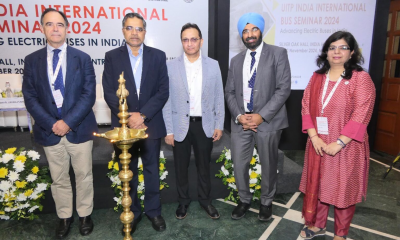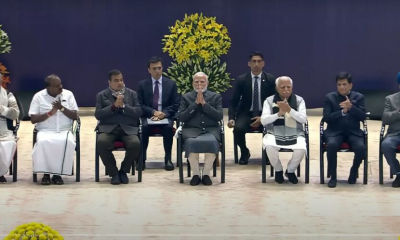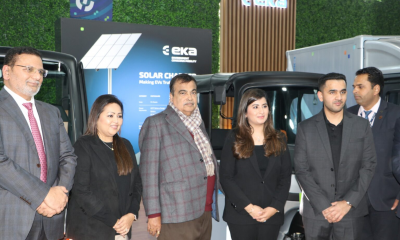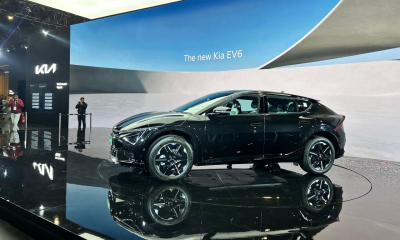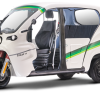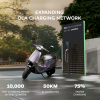EV News
India Electric Vehicle Market
India Electric Vehicle market exhibited a market size of 12,43,258 units in terms of volume in FY 2023. The market witnessed a growth of 154% year-on-year growth over FY 2022. In the forecast years, the market is expected to witness a CAGR of 49% by 2030. India electric vehicle industry hits record sales year across all vehicle segments, accounting for 5.59% of overall automobile sales in India. Ahead of Japan and Germany, to move consumer demand towards greener solutions, there is currently pressure on producers and governments to work together. India government is also taking initiatives by providing incentives and subsidies to manufacturers and customers.
Table 1: India Electric Vehicle Market Size & Share, By Volume, By Vehicle Type, FY2023
| Vehicle Type | Market Size (Units) | Market Share (FY 2023) |
| Two-Wheeler | 7,79,158 | 62.7% |
| Passenger Cars | 53,843 | 32.8% |
| Three-Wheeler | 4,07,381 | 4.3% |
| Buses and Others | 2,876 | 0.2% |
India Electric Vehicle Battery Market – Market Overview
The surge in India’s electric vehicle (EV) battery market results from a convergence of factors reshaping the automotive industry and energy landscape. This growth is influenced not only by domestic factors but also by global trends emphasizing sustainable transportation and technological progress. Environmental considerations play a pivotal role in propelling the EV battery market’s expansion. With severe air quality issues, India actively seeks solutions to curb vehicular emissions, a significant contributor to pollution. EVs, powered by emissions-free batteries, emerge as an appealing option to mitigate air pollution and combat climate change.
Government policies and incentives act as a robust catalyst for the EV battery market’s growth. Various initiatives introduced by the Indian government, including subsidies, tax benefits, and research grants, promote EV adoption. These policies not only enhance EV affordability but also create a favorable environment for battery manufacturing and technology development. The continual advancements in battery technology are instrumental in expanding the market. Lithium-ion batteries, predominant in EVs, have seen significant improvements in energy density, charging speed, and overall performance. Declining battery costs and increased energy storage capacities make EVs more compelling for consumers, further boosting the battery market.
Strategic partnerships and collaborations are fast-tracking the battery market’s growth. Alliances between automakers, battery manufacturers, and technology companies aim to develop advanced battery chemistries, charging infrastructure, and integrated EV solutions. These collaborations accelerate the development and deployment of EV batteries. Moreover, the expansion of the charging infrastructure network enhances consumer confidence in EVs, making them more viable for daily transportation. The increasing availability of charging stations alleviates range anxiety, a common concern for potential EV buyers, thereby driving higher EV adoption rates and subsequently increasing the demand for batteries. This interconnected web of factors propels the EV battery market forward, positioning India at the forefront of the global transition towards sustainable and electric mobility.
India Electric Vehicle Market – Market Trends
- Government Initiatives and Incentives: The Indian government has played a pivotal role in promoting electric vehicles through a series of initiatives and incentives. The Faster Adoption and Manufacturing of Hybrid and Electric Vehicles (FAME) scheme, initially launched in 2015 and subsequently extended, provides financial incentives to both manufacturers and consumers. These incentives include subsidies on electric vehicle purchases, reductions in Goods and Services Tax (GST), and support for charging infrastructure development. Such measures have significantly contributed to the growth of electric vehicle sales in the country.
- Rise of Electric Two-Wheelers: Electric two-wheelers, particularly scooters, have witnessed a surge in demand. The affordability, ease of use, and suitability for urban commuting make electric scooters an attractive choice for a broad spectrum of consumers. Numerous startups and established automotive companies have entered this segment, offering models with competitive pricing and appealing features. The popularity of electric scooters is further fueled by the government’s focus on electrifying last-mile connectivity and the implementation of clean air initiatives in congested urban areas.
- Increasing Electric Four-Wheeler Adoption: The availability and accessibility of charging infrastructure play a crucial role in shaping electric vehicle adoption. Recognizing this, the Indian government has undertaken initiatives to establish a robust charging network across the country. Public-private partnerships and collaborations are driving the installation of charging stations in urban centers and along key transportation corridors. This proactive approach aims to address range anxiety concerns and enhance the overall convenience of electric vehicle ownership.
- Advancements in Battery Technology: Significant strides in battery technology are influencing the electric vehicle market in India. As battery costs decrease and energy density improves, electric vehicles become more economically viable and offer extended ranges. The evolution of battery technology is not only enhancing the performance of electric vehicles but also contributing to the development of indigenous battery manufacturing capabilities. This shift has the potential to reduce dependency on imports, aligning with the government’s ‘Make in India’ initiative and fostering a self-reliant ecosystem in the electric mobility sector.
- Emergence of Electric Rickshaws (E-Rickshaws): Electric rickshaws, or e-rickshaws, have emerged as a vital player in the Indian electric vehicle market. With low operational costs and suitability for short-distance travel in urban and peri-urban areas, e-rickshaws are gaining traction as an eco-friendly alternative to traditional auto-rickshaws. Government incentives and supportive policies aimed at promoting last-mile connectivity solutions have bolstered the adoption of e-rickshaws, contributing to the overall growth of the electric mobility sector.
Electric vehicles (EVs) represent a groundbreaking shift in the automotive landscape, driven by a commitment to sustainability and technological innovation. These vehicles, propelled by electric motors and powered by advanced batteries, offer an eco-friendly alternative to traditional internal combustion engine vehicles. With zero tailpipe emissions, EVs contribute significantly to reducing air pollution and mitigating climate change. The integration of smart technologies and government incentives has fueled their adoption, transforming the transportation sector.
India Electric Vehicle Market – Future Prospects
- Infrastructure Expansion: The future of electric vehicles in India hinges significantly on the continued expansion of charging infrastructure. As the adoption of electric vehicles increases, the need for a comprehensive and accessible charging network becomes paramount. The government, in collaboration with private entities, is expected to further invest in charging infrastructure development, covering urban, suburban, and rural areas. The establishment of fast-charging stations and smart grid technologies will be crucial to support the growing fleet of electric vehicles.
- Innovations in Battery Technology: Ongoing research and development in battery technology are anticipated to bring about transformative changes in the electric vehicle landscape. Advancements such as solid-state batteries, higher energy density, and faster charging capabilities are expected to address current limitations and accelerate the adoption of electric vehicles. Continued investments in research and collaboration between academia and industry players will play a pivotal role in shaping the future of battery technology in electric vehicles.
- Increased Affordability and Model Variety: The future holds the promise of increased affordability and a wider variety of electric vehicle models. As technology advances and economies of scale come into play, the manufacturing costs of electric vehicles are expected to decrease. This, coupled with government incentives, will make electric vehicles more accessible to a broader segment of the population. Additionally, the automotive industry is likely to witness a proliferation of electric vehicle models across various segments, catering to diverse consumer preferences and needs.
- Integration of Smart Technologies: Electric vehicles are poised to become integral components of smart cities and smart transportation ecosystems. The integration of Internet of Things (IoT) technologies, vehicle-to-grid communication, and intelligent traffic management systems will enhance the overall efficiency and functionality of electric vehicles. This shift towards smart mobility solutions aligns with India’s broader vision of sustainable and technologically advanced urban development.
- Collaborations and Partnerships: Collaboration between automotive manufacturers, technology companies, and energy providers will play a crucial role in shaping the future of electric mobility. Strategic partnerships can facilitate the development of comprehensive solutions, including integrated charging infrastructure, innovative business models, and seamless connectivity. Such collaborations will contribute to the creation of a holistic electric mobility ecosystem, fostering innovation and addressing the multifaceted challenges associated with electric vehicle adoption.
- Government Policy Evolution: The future trajectory of electric vehicles in India is closely tied to the evolution of government policies and regulatory frameworks. Continued support through incentives, subsidies, and clear regulations will be essential to sustain the momentum of electric vehicle adoption. As the industry matures, policy frameworks may evolve to address emerging challenges and opportunities, fostering a conducive environment for the growth of electric mobility.
The future of electric vehicles holds the promise of continued evolution and widespread integration. Anticipated advancements in battery technology, expanded charging infrastructure, increased model variety, and supportive government policies are poised to make electric mobility more accessible, efficient, and integral to global transportation solutions. Collaborations between industry stakeholders, innovations in energy storage, and a growing emphasis on sustainable urban planning are set to propel electric vehicles into a mainstream and indispensable mode of transportation.








